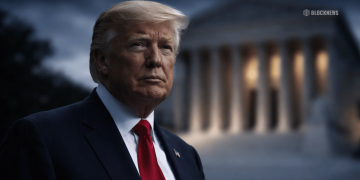Taiwan’s proposed special crypto law aims to address regulatory gaps and establish clear guidelines for cryptocurrency businesses, setting the stage for a more regulated industry.
- Taiwan seeks to introduce a dedicated crypto asset act to regulate the cryptocurrency industry, addressing concerns of regulatory arbitrage and providing a comprehensive framework.
- The proposed special law would require all crypto platforms operating in Taiwan to obtain permits, granting regulators the authority to enforce penalties for non-compliance.
- Challenges in accessing banking services persist for many crypto platforms in Taiwan, with suggestions to encourage crypto-friendly banking solutions to promote regulated industry growth.
Taiwan’s cryptocurrency landscape is undergoing significant changes as lawmakers seek to introduce a dedicated crypto asset act. Yung-Chang Chiang, a member of the Legislative Yuan, Taiwan’s parliament, is pushing to present this draft law for the first reading by the end of November. This move aims to address growing concerns about regulatory arbitrage and establish a comprehensive regulatory framework for cryptocurrencies.
The Need for a Special Crypto Law
Chiang contends that cryptocurrencies diverge significantly from traditional financial products, necessitating distinct regulations. To explore the implications of such a law, Chiang conducted a public hearing at the parliament, engaging virtual asset service providers, legal experts, and academics.
While Taiwan’s Financial Supervisory Commission recently released guidelines for the crypto sector to formulate self-regulatory rules through a potential industry association, Chiang argues that these measures lack enforceability. He emphasizes that a dedicated crypto law would grant regulatory authorities the power to impose administrative penalties on operators who breach these self-regulation rules. Without such a law, regulators would lack the ability to take punitive actions.
Key Provisions of the Proposed Special Law
Chiang’s special law proposal introduces several important provisions. First and foremost, it mandates that all crypto platforms operating in Taiwan must apply for a permit. Failure to do so could result in regulatory orders to cease operations. Currently, virtual asset service providers in Taiwan are required to adhere to anti-money laundering (AML) laws since the Financial Supervisory Commission introduced AML rules in July 2021. However, without a dedicated law, the crypto industry largely remains unregulated.
Chiang acknowledges that it’s improbable for the special law to undergo three readings during the current legislative session, which is expected to conclude by the end of the year. He attributes this delay to an upcoming election and the legislative session’s primary focus on reviewing the government’s budget. Moreover, Taiwan’s Financial Supervisory Commission may propose its version of the special crypto law, potentially not earlier than mid-2024.
Challenges in Accessing Banking Services
Damien Ho, a representative of global partnerships at Binance, emphasized the challenge faced by crypto platforms in Taiwan: lack of access to suitable banking services. Despite efforts by Taiwan’s banking bureau, practical difficulties persist. He suggests that the government should incentivize banks to become more crypto-friendly, fostering regulated and efficient growth in the crypto industry.
Binance has established a local presence in Taiwan named “Binance International Limited Taiwan Branch (Seychelles)” with a registered capital of NT$30 million ($933,000). This reflects the government’s approval of Binance’s company registration on May 12, 2023, and signifies the exchange’s commitment to AML compliance in the region.
A Gradual Approach to Regulation
Winston Hsiao, co-founder and Group CRO of XREX, emphasized the importance of compliance in the crypto industry during a public hearing. He proposed a step-by-step approach to regulation, categorizing crypto platforms based on their size for better supervision. Small entities can follow self-supervisory rules, while large entities require a special permit and relevant financial licenses.
Conclusion
Taiwan’s journey towards cryptocurrency regulation through a dedicated special law represents a significant step in addressing concerns related to offshore exchanges and ensuring the industry’s integrity. While challenges persist in accessing banking services and a clear timeline for the law’s enactment remains uncertain, the proposed legislation underscores Taiwan’s commitment to fostering a regulated and secure environment for cryptocurrency businesses. This development will be closely watched by industry stakeholders, as it has the potential to significantly impact the cryptocurrency landscape in the region.














